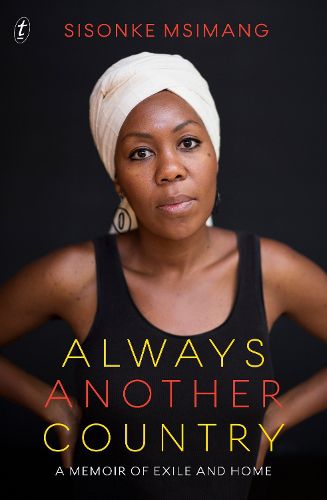Readings Newsletter
Become a Readings Member to make your shopping experience even easier.
Sign in or sign up for free!
You’re not far away from qualifying for FREE standard shipping within Australia
You’ve qualified for FREE standard shipping within Australia
The cart is loading…






Sisonke Msimang was born in exile, the daughter of South African freedom fighters. Always Another Country is the story of a young girl’s path to womanhood - a journey that took her from Africa to America and back again, then on to a new home in Australia.
Frank, fierce and insightful, she reflects candidly on the abuse she suffered as a child, the naive, heady euphoria of returning at last to her parents’ homeland - and her disillusionment with present-day South Africa and its new elites. Sisonke Msimang is a bold new voice on feminism, race and politics - in her beloved South Africa, in Australia, and around the world.
$9.00 standard shipping within Australia
FREE standard shipping within Australia for orders over $100.00
Express & International shipping calculated at checkout
Sisonke Msimang was born in exile, the daughter of South African freedom fighters. Always Another Country is the story of a young girl’s path to womanhood - a journey that took her from Africa to America and back again, then on to a new home in Australia.
Frank, fierce and insightful, she reflects candidly on the abuse she suffered as a child, the naive, heady euphoria of returning at last to her parents’ homeland - and her disillusionment with present-day South Africa and its new elites. Sisonke Msimang is a bold new voice on feminism, race and politics - in her beloved South Africa, in Australia, and around the world.
Perth-based South African writer Sisonke Msimang was raised in exile in the 1970s and 80s by her South African freedom-fighter parents. Her childhood and early adulthood were spent in Zambia, Canada, Kenya and the United States. After apartheid, her family was finally able to return to South Africa, but as it turned out, that wasn’t to be Msimang’s last move.
To read this memoir is to witness a personal and political response to oppression in remarkably recent history. Msimang is explicit about who she is, where she has come from and the battles she has fought – and continues to fight. She is also frank about how her family’s experience differs from those in positions of greater, and lesser, privilege.
Msimang’s writing is full of hard-earned personal insight, and astonishing empathy. Many striking moments leave a painful, permanent impression: ‘And then, one day, in the middle of everything that was becoming mundane and ordinary, on a day just like the ones that had come before it, I was called an African monkey.’
It is not possible to do this book justice in so few words. Msimang engages with recurring issues: racism, feminism, and class; but this is also a story of a young girl’s childhood, coming of age, and family; of politics, democracy, fighting for ideals, and seeing idols fall. Above all, it is a story of a search for and construction of identity.
Always Another Country is eloquent and powerful. Msimang’s explication of what it means to be from – but not of – a place is profoundly moving. Msimang deserves to be widely read and fans of Roxane Gay and Maxine Beneba Clarke, in particular, will not be disappointed.